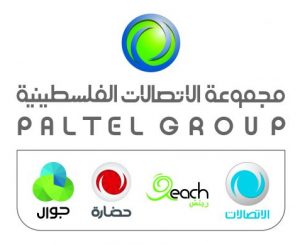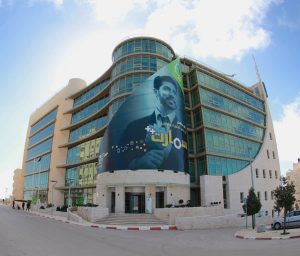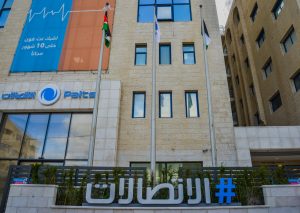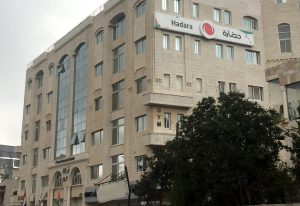The Palestinian telecommunications sector has evolved over the past two decades and is gaining more momentum than ever before by advancing the development and image of the ICT sector both within Palestine and among the international community. The sector’s ultimate goal is to connect every Palestinian to the rest of the world.
Whereas Palestine is a country with a relatively small population, its many young and well-educated people constitute rich human capital that – if given the opportunity to freely develop – could significantly contribute towards making Palestine a country with a booming and sustainable economy. The ICT sector’s net contribution to the Palestinian market amounts to US$ 600 million. The telecommunications sector has played a vital role in the development of Palestine’s infrastructure, quality of life, quality of education, and recognition of its rich, innovative culture. The ICT sector is a foundation for Palestinian startups and contributes 5.5 percent to the total Palestinian GDP. It consists of a 100 percent digital telecommunication infrastructure that has been entirely developed by the Palestinian private sector and hosts more than 250 companies specialized in the field of information and communication technology. The market has over 4.3 million mobile phone subscribers and over 470,000 fixed-line subscribers, in addition to 100 radio stations and local television stations as well as 17 companies that operate in the field of telecommunications, and the internet.
A sustainable company such as Paltel Group has proven to be the pioneer of the telecommunications sector in Palestine and has been able to achieve the highest standard in telecommunications services by wisely investing in modern technologies, telecom infrastructure, and human resource development.
Over the past 20 years, Palestine Telecommunications (Paltel) Group has evolved into the most critical force of the Palestinian ICT sector with a market capitalization of US$ 800 million in shares in 2018. Paltel Group is the largest employer in Palestine (after the government), employing around 3,000 people. It is the engine of the telecom industry and leads in the provision of the latest services and technologies, in accordance with international standards and specifications. Paltel Group represents 25 percent of the Palestinian stock market as a public shareholding company. It has achieved this by embedding sustainability as an integral part of the Company’s identity, an essential function of its operations and strategy.
Paltel Group consists of four companies: Palestine Telecommunications (Paltel), Palestine Cellular Communications Ltd. (Jawwal), Hadara Company (internet provider), and Reach (contact center). The Group started its operations in Palestine in 1995 by providing state-of-the-art services to the Palestinian end user. Its variety of services includes local and international fixed-telephony services, internet, data communications, mobile services, and next-generation services. Paltel Group has shown great determination in its efforts to deliver high-quality telecommunications services, as each subsidiary company provides a high quality of telecommunications services within Palestine through the adaptation of international technologies in order to improve the Palestinian quality of life and increase community livelihood.
While Paltel Group is an epitome of achievements and successes, each milestone required that a string line of challenges and obstacles be tackled. Back in January 2018, Jawwal mobile operator was finally able to launch 3G services in the West Bank after years of wrangling with Israeli authorities to persuade them to lift their ban on Palestinian mobile companies and grant them the necessary frequencies and third-generation services. Of course, the range of 3G frequencies is very limited: One 5 MHz frequency is dedicated and 5 others shared, indicating that Palestinians are only allowed to use that one specific frequency within the West Bank, whereas Israeli operators can use theirs in Israel and the West Bank, requiring Palestinians to coordinate with Israel on border areas. A decade of ongoing work was necessary for this achievement. Yet to date, 3G services are available only in the West Bank but not in Gaza.
The launch of 3G in Palestine is a strategic step that will have a positive effect on the national communications infrastructure and the Palestinian economy as a whole. In addition, as the telecommunications leader in Palestine, Paltel Group has the obligation and the right to continue to demand 4G capabilities in Palestine, as most of the world already has 4G technology, and 5G will be available in the coming year.
Moreover, Israeli mobile operators illegally target Palestinian consumers by operating within the Palestinian market without licenses, paying neither fees nor taxes, nor contributing any value-added services to the Palestinian economy. In the meantime, Palestinian operators are not allowed to build any infrastructure in Area C, which exacerbates the illegal competition from Israeli operators in more than 60 percent of the West Bank area. The deliberate Israeli siege of the Palestinian ICT sector aims to negatively impact the ability of Palestinian companies, mobile operators, internet providers, and the State of Palestine as a whole. By preventing the Palestinian telecommunications sector from prospering and functioning at its best, Palestinians are hampered in their efforts to evolve into an innovative high-tech society, and the telecommunications industry is impeded heavily in its efforts to become the engine of the Palestinian economy. Nevertheless, and despite these challenges, IT and digital entrepreneurship are considered an emerging sector in the Palestinian economy with a strong potential for growth and job creation.
The ICT sector in Palestine in numbers*
· 100% digital telecommunication infrastructure has been entirely developed by the Palestinian private sector.
· Palestine hosts more than 250 companies specialized in the field of information and communication technology.
· The IT sector contributes to 5.5% of the total Palestinian GDP.
· US$ 600 million is the net contribution of the ICT sector to the Palestinian market.
· The market has over 4.7 million mobile phone subscribers (including the illegal Israeli mobile subscribers, as four Israeli mobile providers operate in Palestine without a license), over 400,000 fixed-line subscribers, 100 radio stations and local television stations, and 17 companies operating in the field of telecommunications and the internet.
· 40% of Palestinian technology companies are engaged in outsourcing projects for multinational companies.
· 13 Palestinian universities teach ICT-related courses.
Regardless of the limitations and setbacks that Palestine and its people and companies endure, our ICT sector, community, and businesses continue to grow and prosper. As the front-runner of the telecom sector, Paltel Group’s current priority is to obtain the needed frequencies from the Israeli authority to launch 3G service in Gaza. After that, it will start to work on requiring the release of 4G frequencies from the Israeli authorities.
Palestinian ICT sector strengths
· Rich human capital
· Young and well-educated population
· Innovative youth as a result of the blockade in Gaza
· Geographical proximity
· Presence of multinational companies in the area
Illegal competition by Israeli operators
· The number of Palestinian subscribers with Israeli providers reached 600,000 in 2018, with a predicted 1 million subscribers by 2020.
· Israeli operators have an illegal market share of 17% in Palestine.
· 73% of subscribers with Israeli providers use prepaid plans.
FTTH and fixed broadband remain priorities as well. The average speed for fixed broadband in Palestine is among the highest in the region. Paltel Group used the absence of mobile broadband to increase the availability and speed of the fixed broadband and currently has a well-structured network and infrastructure.
Paltel Group has served as the largest incubator for youth and their initiatives and for entrepreneurship in the Palestinian society as a whole. The Group has given priority to social responsibility and has been a role model for other companies in Palestine. For that reason, Paltel Group established its own independent corporate social-responsibility foundation, known as Paltel Group Foundation for Community Development, which focuses on various forms of youth empowerment by providing equal opportunities to all segments of society. It engages in education and promotes a knowledge-based society by encouraging entrepreneurship and by identifying role models that may inspire future generations of Palestinians. Such endeavors will ultimately advance the telecom sector in Palestine and drive long-term national economic growth.
* Palestinian Investment Promotion Agency PIPA, available at
http://goo.gl/PTqN9n.







